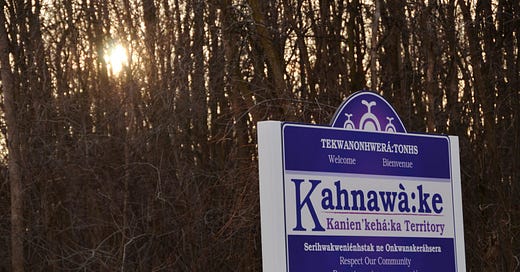Puff, Pouch, and Progress: Kahnawake's Response to Canada's Nicotine Debate
Nicotine pouches highlight issues of sovereignty and overregulation in Canada.
By Kevin Haynes
Along the southern shore of the St. Lawrence River, the Kahnawake Mohawk reserve can feel far removed from the world of global policy and regulation, but this could not be further from the truth. If one visits one of the many shops that exist on the reserve, they would find a myriad of products that are regulated and not available in the rest of Canada — one of them being the tobacco-free Nicotine pouch, known more colloquially as a “Zyn”.
The rest of Canada outside the reservation knows these products by a different name: Zonnic. Zonnic is a nicotine-pouch which was approved for sale by Health Canada in July of 2023, as it was a part of the Natural Heath Product Regulations under the Food and Drugs Act. The approval, which is contingent on the product having 4 mg or less of nicotine per pouch, bypassed typical prescription requirements for higher-dose nicotine products. The products ballooned in popularity, but with growing popularity came scrutiny. Regulators raised their eyebrows, concerned with the pouch’s growing appeal. By October of last year, Zonnic pouches — flavoured and brightly packaged — began to pop up in gas stations and convenience stores, igniting concern among public health advocates.
For Health Minister Mark Holland, this was a wake-up call. “We were duped” Holland declared, as health groups raised alarms about the product's worrying potential to create a new generation of nicotine users. National health organisations were quick to demand action, in spite of the fact that these offered a harm reduction alternative for the traditional cigarette and vaporizer. They called for stricter regulations, asking the government to classify nicotine pouches as prescription-only products, or at the very least, to pause sales until provincial legislation could catch up. Health Canada, meanwhile, faced scrutiny for allowing the pouches to hit the market without giving provinces time to prepare. And so, the battle lines were drawn. What will follow is a regulatory dance that will pit health advocates and organisations against the corporations which stand to profit off of these new nicotine products, which includes tobacco companies.
While Canada moved to clamp down, not everyone had to listen to the federal government. On the Kahnawake Mohawk reserve, a different story began to unfold. In Canada, Indigenous people are allowed to sell tobacco products due to their unique legal status and rights that predate the creation of Canada itself. This special status is grounded in historical treaties, the first one being the Royal Proclamation of 1763, and provisions under the Indian Act. This legal framework has allowed reserves like Kahnawake to sell tobacco products free of government scrutiny despite constant pressure and legal battles with the province of Quebec. When it comes to nicotine pouches, the dynamic remains unchanged — the stores in Kahnawake can continue to sell federally regulated pouches with impunity.
This is a good thing. At the heart of this issue is a question that reaches past nicotine and public heath: the issue of freedom. Canada has increasingly become a nation bogged down by bureaucratic red tape, where every new idea, product, or innovation must be filtered through countless layers of regulation before it can ever see the light of day. We see this not just in the realm of nicotine pouches, but across sectors, from agriculture to housing to healthcare. But on the Kahnawake Mohawk Reserve, there is something very refreshing and seemingly forgotten in the rest of Canada — a little bit of freedom. The people here have the power to make decisions for themselves, free from overzealous regulators. They are free to sell nicotine pouches as they see fit, and the customers are free to buy them.
There are none of the bureaucratic hoops that have come to define this nation. They offer alternatives to smoking that, while controversial, provide adults with choice — something that should be the hallmark of any free society. The reservation offers a glimpse into a different kind of governance — one that values autonomy and self-determination over top-down control. Canada could learn a thing or two from the Kahnawake reservation, and the wonderful people who live and work in it. If experience with this country provides any indication, Canada won't learn a thing.
Kevin Haynes has a strong theoretical foundation with degrees in political science and philosophy. He is a versatile professional with experience in leadership, technology, and campaign management. His time in post-war Croatia, along with his roles in political campaigns and IT support, has enhanced his adaptability and problem-solving abilities. Kevin is proficient in managing both hardware (physical technologies) and software systems (virtual technologies), skills that support his ability to lead teams and implement solutions effectively. He is also skilled in conflict resolution and decision-making under pressure, with strong communication and organizational capabilities, focusing on security technologies and stakeholder management.




